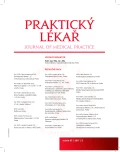Health literacy of seniors and its impact on health and the use of health services
Authors:
H. Hajduchová; S. Bártlová; I. Brabcová; L. Motlová; L. Šedová; V. Tóthová
Authors‘ workplace:
Zdravotně sociální fakulta, Děkanka: prof. PhDr. Valérie Tóthová, Ph. D.
; Ústav ošetřovatelství, porodní asistence a neodkladné péče, Ředitelka: doc. PhDr. Sylva Bártlová, Ph. D
; Jihočeská univerzita v Českých Budějovicích, Rektor: doc. Tomáš Machula, Ph. D., Th. D.
Published in:
Prakt. Lék. 2017; 97(5): 223-227
Category:
Of different specialties
Overview
Introduction:
Health literacy represents the degree to which individuals are able to find out, absorb and understand health information and services in order to make right decisions about their health. Insufficient health literacy is common in elderly individuals and is associated with a number of problems, such as poor use of preventive medical service, problems with observing the prescribed medication, frequent hospitalizations, increased health care expenses and increased mortality. The goal of the study was to find out the level of health literacy in the target 65+ population and the relation to the health condition of the respondents, the influence of health problems on activities and using health services.
Methodology:
Trained questioners using structured interviews collected the data. The sample consisted of 326 respondents. The interview structure was derived from a standardized HLS-EU-16 questionnaire designed for the identification of health literacy of the population complemented by a few questions of socio-demographic character.
Results:
A statistically significant correlation was proven between health literacy and the health condition in a selected sample of elderly individuals. The worse health condition was mentioned, the lower was the respondents’ health literacy. On the contrary, respondents with a better health condition had significantly higher health literacy. The elderly individuals with inadequate health literacy said significantly more frequently that they suffered from more than one long-term (chronic) disease. Furthermore, it was found out that the lower the health literacy is, the more frequently the respondent has seen his/her doctor in the last 12 months. The individuals with lower health literacy have contacted significantly more frequently emergency service in the last two years. There was also proven a significant correlation between health literacy and the number of hospitalizations in the last 12 months.
Conclusion:
The improvement of health literacy in this age group is important for the management of the elderly’s health and one of the ways of healthy ageing.
Keywords:
the elderly – health literacy – health
Sources
1. Sørensen K, Pelikan JM, Röthlin F, et al. Health literacy in Europe: comparative results of the European health literacy survey (HLS-EU). Eur J Public Health 2015; 25(6): 1053–1058.
2. Institute of Medicine of the National Academies. Health literacy: a prescription to end confusion. Washington, DC: National Academies Press 2004.
3. Kobayashi LC, Wardle J, Wolf MS, et al. Aging and functional health literacy: a systematic review and meta-analysis. J Gerontol B Psychol Sci Soc Sci 2016; 71 : 445–457.
4. Zamora H, Clingerman EM. Health literacy among older adults: a systematic literature review. J Gerontol Nurs 2011; 37 : 41–51.
5. Manafo E, Wong S. Health literacy programs for older adults: a systematic literature review. Health Educ Res 2012; 27 : 947–960.
6. Findley A. Low health literacy and older adults: meanings, problems, and recommendations for social work. Soc Work Health Care 2015; 54 : 65–81.
7. Geboers B, Brainard JS, Loke YK, et al. The association of health literacy with adherence in older adults, and its role in interventions: A systematic meta-review. BMC Public Health 2015; 15 : 903.
8. Brainard J, Loke Y, Salter C, et al. Healthy ageing in Europe: prioritizing interventions to improve health literacy. BMC Res Notes 2016; 9 : 270.
9. Chesser AK, Keene Woods N, Smothers K, et al. Health literacy and older adults: A systematic review. Gerontol Geriatr Med 2016; 2 : 1–13.
10. Kučera Z, Pelikan J, Šteflová A. Zdravotní gramotnost obyvatel ČR − výsledky komparativního reprezentativního šetření. Čas. Lék. čes. 2016; 155 : 233–241.
11. World Health Organisation Regional Office for Europe. Strategy and action plan for healthy ageing in Europe, 2012–2020. Copenhagen: World Health Organisation Regional Office for Europe 2012.
12. Baker DW, Gazmararian JA, Williams MV, et al. Functional health literacy and the risk of hospital admission among Medicare managed care enrollees. Am J Public Health 2002; 92 : 1278–1283.
13. Rasu RS, Bawa WA, Suminski R, et al. Health literacy impact on national healthcare utilization and expenditure. Int J Health Policy Manag 2015; 4(11): 747–755.
14. Vandenbosch J, van den Broucke S, Vancorenland S, et al. Health literacy and the use of healthcare services in Belgium. J Epidemiol Community Health 2016; 0 : 1–7.
15. Sudore RL, Mehta KM, Simonsick, EM, et al. Limited literacy in older people and disparities in health and healthcare access. J Am Geriatr Soc 2006 54 : 770–776.
Labels
General practitioner for children and adolescents General practitioner for adultsArticle was published in
General Practitioner

2017 Issue 5
- Advances in the Treatment of Myasthenia Gravis on the Horizon
- Memantine Eases Daily Life for Patients and Caregivers
- Memantine in Dementia Therapy – Current Findings and Possible Future Applications
- Possibilities of Using Metamizole in the Treatment of Acute Primary Headaches
- Metamizole vs. Tramadol in Postoperative Analgesia
-
All articles in this issue
- Honey and health
- Functional disorders of the musculoskeletal system
- Modern technology and its application in home-based rehabilitation
- Prostate cancer and secondary prevention in general practitioners’ offices
- Health literacy of seniors and its impact on health and the use of health services
- Selected problems in female patients with relapsing-remitting sclerosis multiplex
- European guide on good practices for Patient Blood Management
- General Practitioner
- Journal archive
- Current issue
- About the journal
Most read in this issue
- Functional disorders of the musculoskeletal system
- Selected problems in female patients with relapsing-remitting sclerosis multiplex
- Honey and health
- European guide on good practices for Patient Blood Management
